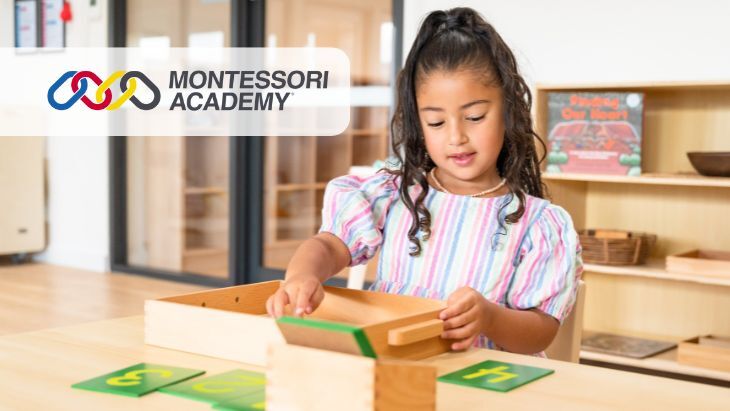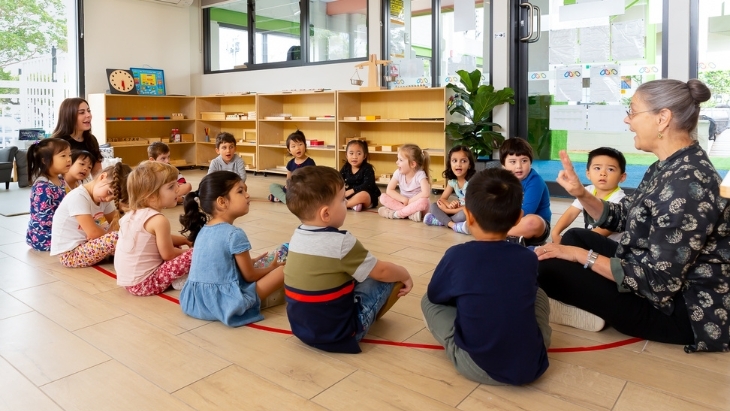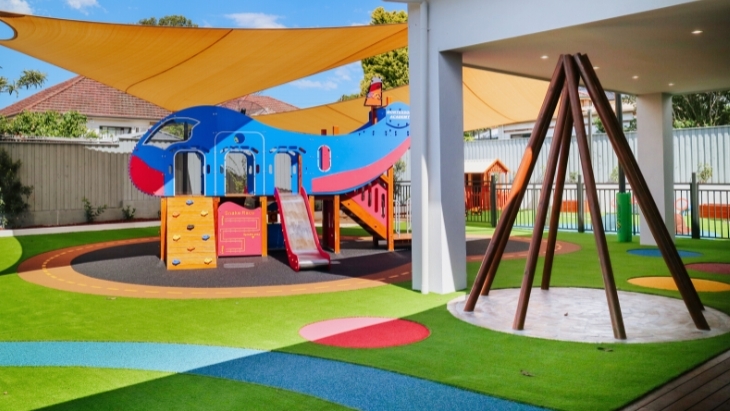Montessori Academy Childcare & Preschool – NSW, VIC & ACT
- Preschoolers

The Montessori Academy Preschool Program prepares children for their transition to school through a structured academics and well-being program.
By building on the foundational knowledge provided by previous programs, it encourages confidence, independence, problem-solving, creativity, and real-life skills.
Everything you Need to Know About the Montessori Academy Preschool Program

Learning in the Preschool Community
Montessori Academy offers a dynamic learning environment where children can pursue their interests, choose their work, and progress at their own pace. During this time, children develop independence, refine their concentration, and expand their intelligence and higher-level thinking skills.
Preschoolers move through sensitive periods for language, order, grace, courtesy, senses, writing, small objects, reading, music, spatial relationships, and mathematics between the ages of three and six. A wide range of advanced Montessori materials is introduced to children during this stage of development, building on their practical life, sensorial, mathematics, language, and cultural knowledge.
Children's interests are reflected in the preschool classroom design and the educational materials inside, which provide rich learning opportunities that nurture their development and prepare them for school.
Preschool Learning Goals
- Letter and number formation
- By rote, recognises numerals and counts
- Constructs phonetic words from simple sentences
- Writes and recognises their own name
- Understanding of the decimal system, addition, and subtraction
- Plays games according to the rules and participates in physical activities
- Interacts well with others and shows self-confidence
- Concentration and independent work skills
- Demonstrates problem-solving skills in response to challenges.
Preschool Curriculum
Practical Life
The focus of practical life activities is on taking care of oneself, taking care of others, and taking care of the environment. Practical life activities also promote independence, social skills, grace and courtesy, concentration, and coordination, in addition to teaching daily life skills.
These are some examples of materials and activities for practical life skills:
- Tonging
- Grating
- Threading
- Lessons in Grace and Courtesy
- Nuts and bolts.
Sensorial
The purpose of sensory activities is to help children develop and refine their senses of sight, touch, taste, smell, and sound.
Objects can be classified, sorted, and discriminated according to their sensory impressions using these skills. In order to learn languages and mathematics, these skills are necessary.
These are some examples of sensorial materials and activities:
- Red rods
- Superimposed shapes
- Geometric solids
- Sound cylinders
- Trinomial cubes.
Mathematics
Through hands-on experiences, Montessori mathematics materials help children understand abstract mathematical concepts.
The mathematics materials teach students to identify and quantify numerals, count and sequence numbers, add and subtract, and identify patterns.
These are some examples of mathematics materials and activities:
- Number rods
- Spindle boxes
- Hanging bead stair
- Addition stripboard
- Hundred board.
Language
Children learn literacy skills and develop their vocabulary through Montessori language materials.
During the early stages of writing and reading, children learn letter recognition, phonics, vowels, and consonants through conversation, singing, and hands-on materials.
These are some examples of language materials and activities:
- Moveable alphabet
- Metal insets
- Object picture-matching cards
- Three part cards
- Object boxes.
Culture
As part of the Montessori Culture Curriculum, students study art, geography, science, the environment, national culture, music, and history.
Children learn about their community and the world through cultural activities. Through this process, they discover similarities and differences and develop an appreciation for diversity and all living things.
These are some examples of materials and activities for cultural studies:
- Land and water forms
- Continent boxes
- Botany cabinet and puzzles
- Life cycle puzzle and activities
- Map cabinet.
Early Years Learning Framework
All Montessori Academy childcare centres also teach the Australian Government's Early Years Learning Framework (EYLF): Belonging, Being & Becoming.
To support children's learning from birth to age five, the EYLF incorporates five learning outcomes.
The Five Key Outcomes of the EYLF:
Outcome 1: Children have a strong sense of identity
Outcome 2: Children are connected with and contribute to their world
Outcome 3: Children have a strong sense of well-being
Outcome 4: Children are confident and involved learners
Outcome 5: Children are effective communicators

For more information, visit Montessori Academy.

Tell them ellaslist sent you!
Reviews


